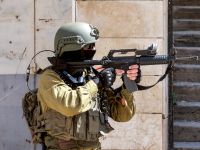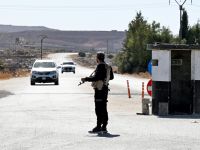The Israeli army will withdraw from positions in and around the West Bank city of Bethlehem and from the Gaza Strip on Monday night, security sources said after Monday's U.S.-brokered meeting of the Israeli-Palestinian security committee.
The sources also said there would be a renewal in security coordination between the two sides, and the committee would reconvene in the coming days.
Earlier, Israel’s Defense Minister Benjamin Ben-Eliezer voiced hope Monday that the U.S.-brokered meeting would result in an Israeli withdrawal from Palestinian-ruled areas of the West Bank and the Gaza Strip by nightfall.
Ben-Eliezer, speaking to reporters, said that the meeting - mediated by U.S. envoy Anthony Zinni and attended by Israel’s Shin Bet security service chief Avi Dichter and senior Palestinian security officials Jibril Rajoub and Mohammed Dahlan - was "intended to nail down two issues."
Firstly, said the defense minister, it was convened in order "to resolve final details so that the evacuation can take place tonight, and I hope it will."
Ben-Eliezer said the second focus of the meeting was the cease-fire outline drafted by CIA Director George Tenet. The talks could soon lead to a cease-fire declaration, Ben-Eliezer said, adding that in that event, "the path to entering into the Tenet track will be entirely open."
Nonetheless, he cautioned, "We are prepared for all situations, including a situation in which there will be no cease-fire. No one can go and deny us our right to defend ourselves. This is our ultimate obligation."
The meeting followed surprise security talks held overnight by Israeli and Palestinian field commanders in the West Bank and Gaza Strip, amid signs of possible progress in Zinni's truce mission.
The two sets of meetings were held ahead of the arrival in Israel on Monday afternoon of U.S. Vice President Richard Cheney.
Meanwhile, Israeli Security forces arrested two Palestinians on Monday along the seam line, north of the West Bank city of Jenin. An explosive device, two Kalashnikov assault rifles and hand grenades were found in the two's possession.
It is believed that they were on their way to carry out an attack in the northern town of Afula.
Palestinians also fired two home-made Qassam-2 rockets early Monday evening, which landed near the Israeli Kibbutz of Zikkim, close to the border with the Gaza Strip. Shortly afterward, a mortar fell near the Negev town of Sderot. No one was injured in either attack.
In Hebron, Palestinians said that undercover Israeli agents had shot and seriously wounded a top-ranking Hamas activist Monday. The sources said that Taleb Abu Sneina was then kidnapped by the soldiers. Two other Palestinians wounded in the attack were taken to hospital in the West Bank city.
Israel is also reported to have arrested eight Palestinians from the Bethlehem area during an operation in the Jura refugee camp.
Cheney
Cheney arrived Monday afternoon amid hopes Palestinian irritation at the absence from his agenda of a meeting with Yasser Arafat.
"The United States will do all it can to bring about a cease-fire between Israel and the Palestinians," Cheney said in Kuwait before flying to Tel Aviv.
U.S. envoy Anthony Zinni met Cheney at Tel Aviv airport and drove with him to Jerusalem.
Asked if U.S. efforts would involve him meeting Arafat, Cheney replied: "I am going to meet General Zinni ... and what, if any contribution, I can make to his ongoing effort is something I can look to him for guidance on this afternoon."
U.S. officials have said Cheney was not scheduled to meet Palestinian Authority members during his visit to Israel, the last stop on an 11-nation Middle East tour aimed at drumming up support for Washington's next moves in a global anti-terror war.
Palestinian officials have said this demonstrated a U.S. bias towards Israel and its prime minister, Ariel Sharon. A Cheney aide said "the door is certainly open" for a meeting with Arafat but cautioned that it was not inevitable.
"I wonder how Cheney can say he's pursuing peace between the Palestinians and Israelis by meeting the leader of one side and not the other," senior Palestinian negotiator Saeb Erekat said.
U.S. officials have said that, during his visit to Israel, Cheney has made clear that he does not intend to play any negotiating role. The vice president's schedule, however, could be extended slightly if warranted. Cheney will also take his impressions of a Saudi Middle East peace initiative to Israel.
Speaking at a reception at Israel Prime Minister Office in Jerusalem, Cheney said that the U.S.'s goal is to end the violence between Israel and the Palestinians and to renew political talks that would put an end to the conflict.
Israel’s Prime Minister, addressing the visiting vice president said, "Israel is a peace-seeking nation and we are making every effort to reach an immediate cease-fire. I have in the past declared that in order to achieve a true, just and durable peace, I am willing to make painful compromises. But we cannot make any compromise when it comes to the security of our citizens and their right to live without the threat of terrorism and violence."
Sharon thanked Cheney for standing by Israel and the Jewish people, adding, "your visit here at this time is important to all those who are seeking peace", Haaretz reported.
Annan
UN Secretary-General Kofi Annan has told Israeli Prime Minister Ariel Israel's recent attacks in the Palestinian territories resembled "all-out conventional warfare," resulting in illegitimate strikes on civilians, ambulances and schools, according to a letter obtained on Monday.
The blunt letter, unusual for Annan, was sent to Sharon on March 12 during a week of increasing world criticism of Israel's use of heavy weaponry against Palestinians in the West Bank and Gaza Strip.
"Judging from the means and methods employed by the Israel Defense Force - F-16 fighter bombers, helicopter and naval gunships, missiles and bombs of heavy tonnage - the fighting has come to resemble all-out conventional warfare," he said.
"Israel is fully entitled to defend itself against terror," Annan wrote. "But this right does not discharge it of its obligation to respect the fundamental principles and rules of international law." (Albawaba.com)
© 2002 Al Bawaba (www.albawaba.com)







